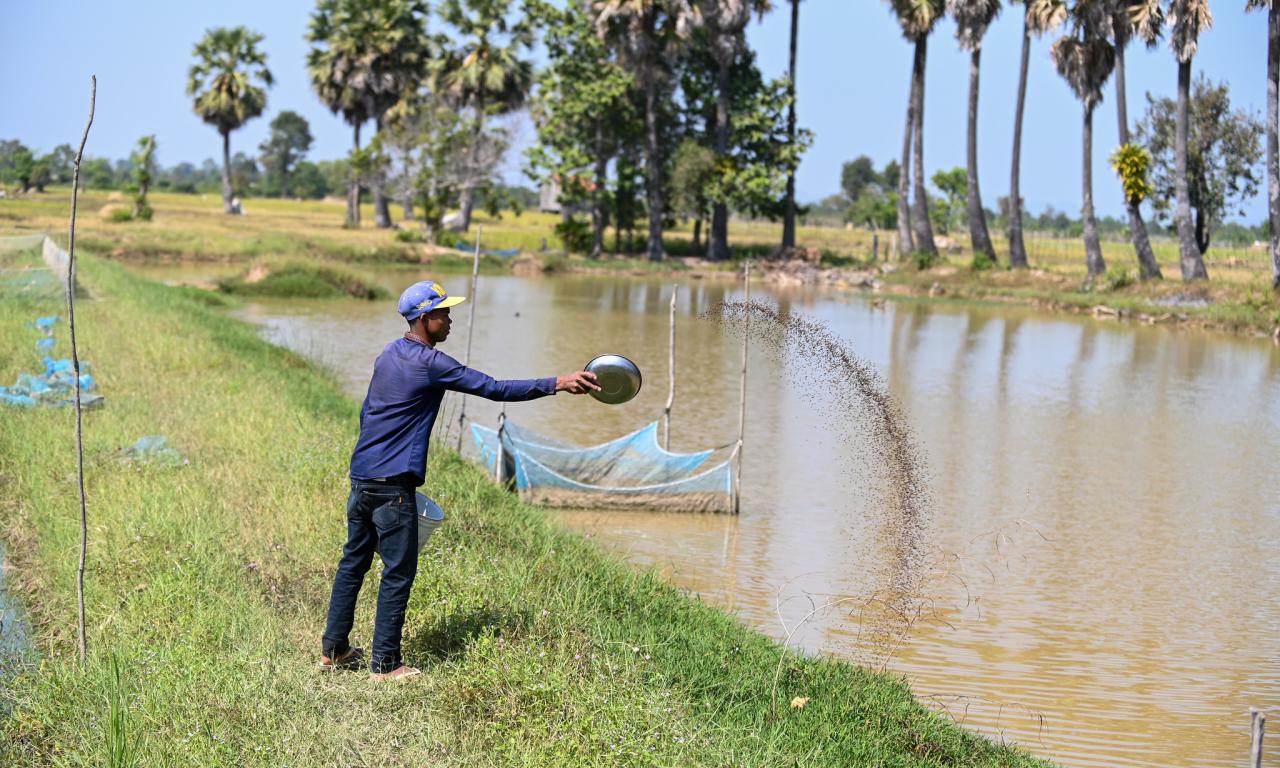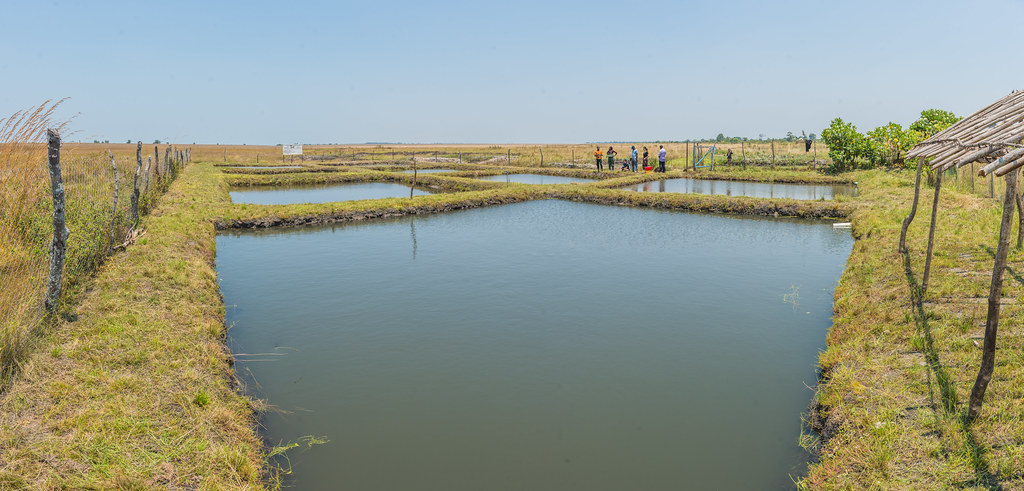
New fish feed formulations work to nourish both fish and their pond ecosystems using locally available and accessible ingredients.
Innovations in fish feed formulations are key to improving aquaculture’s environmental and economic sustainability, said a multidisciplinary group of panelists in a virtual learning session hosted by WorldFish.
The Fish4Thought webinar gathered researchers, practitioners and private sector partners to launch a new strategic brief from the CGIAR Research Program on Fish Agri-Food Systems, Sustainable and accessible fish feeds for small-scale fish farmers, and discuss its implications for healthy fish, people and planet.
The brief highlights the development of ‘nutritious pond feeds’ that nourish both fish and pond organisms in support of a functional ecosystem, while maintaining or increasing smallholder farm productivity and profitability.
Fish ponds are the predominant way to farm fish in much of Asia and Africa, but their natural food webs are often overlooked in feed formulations.
“An optimal fish feed needs to meet all the nutritional requirements of the specific fish species under the relevant conditions. In a pond, there is a natural food web that also needs to be considered,” said Geert Wiegertjes, Associate Professor at Wageningen University.
Conventional fish feeds tend to focus only on nourishing the farmed species. Conversely, nutritious pond feeds nourish both the farmed species and pond microorganisms, like bacteria and plankton, to stimulate the pond’s inherent capacity to break down waste and produce natural foods for the fish.
Event speakers endorsed the brief’s recommendations to develop sustainable, holistic feeds and better management practices that can foster a more inclusive and equitable global food system ahead of the UN Food Systems Summit.
“I am very glad to see that the research in nutritious ponds proves the concept of feeding both the fish and the natural ecosystems works in practice. These systems are shown to be more robust and reduce the risk of disease, contributing to more predictable farming systems,” said Arjen Roem, Strategic Marketing Director of Skretting Asia.
Fostering healthy ecosystems

The brief’s authors called for nutritious pond feeds to be formulated with locally accessible, underused carbohydrates from agricultural processing—like cassava and banana peels—to reduce dependency on ingredients that are expensive, imported or can be directly consumed by humans.
Fiber-rich carbohydrates fuel the microorganisms in pond ecosystems and help them to decompose fish waste and uneaten feed. Conventional fish feeds, which are low in carbohydrates but high in protein, lead to nutrient-rich fish wastes that cannot be adequately broken down and contribute to pollution in waterways.
“The fish waste from conventionally formulated feeds is difficult to degrade because it is low in carbon and energy, and that leads to poor water quality and unhealthy fish,” said Marc Verdegem, the brief’s co-author and Associate Professor at Wageningen University.
To support healthy fish and pond ecosystems, the brief synthesizes research on the use of local underused ingredients in feed, fish and ponds’ nutrient requirements and the best feeding practices, explained Rodrique Yossa, co-author and WorldFish scientist.
The researchers reviewed the nutritional content of fifteen local ingredients and the impacts of feeding them to genetically improved Nile tilapia. The findings were integrated into the FeedCalculator, an open access feed formulation app, to help local feed millers and farmers develop fish feeds that meet their needs.
Adopting new feeds

Fish feeds usually account for 30-70 percent of all operating costs, and conventional fish feeds remain inaccessible to many small-scale fish farmers. This is particularly true for women and youth in the sector, who often have less income, fewer assets and greater barriers to accessing inputs.
Researchers must demonstrate that alternative fish feeds and feeding practices will give smallholders a higher profit margin to encourage the adoption of new feeds, explained Bernadette Fregene, WorldFish’s Aquaculture Compact Leader for Technologies for African Agricultural Transformation.
The event’s speakers emphasized that new sustainable feeds must lead to more inclusive outcomes and foster socioeconomic empowerment. Need and risk assessments are being conducted to foster the inclusive development and scaling of local fish feed ingredients, while also identifying potential impacts on already marginalized groups.
“Local ingredients for fish feeds may already be allocated for other purposes, such as providing feed for chickens or goats, which women heavily rely on for autonomous income. It is important to recognize the potential risks associated with the diversion of ingredients into fish feeds,” said Sujata Ganguly, South Asia Gender Empowerment and Social Inclusion Lead at Includovate.
Efforts are ongoing to improve the social, economic and environmental sustainability of fish feeds to ensure benefits reach even the most marginalized of fisheries actors. In collaboration with partners, WorldFish has trained feed millers and fish farmers across Asia and Africa on nutritious pond feeds, local feed ingredients and the FeedCalculator to promote the uptake and dissemination of these innovations and support their livelihoods.
“While increasing pond output and more efficient production is of real value to smallholders, we also need to foster robust stable ecosystems in order to preserve our natural resources and ensure a sustainable future for all,” said Wiegertjes.
